The chairman of the Federal Communications Commission (FCC) has cagily created a new and coercive technique for operating outside the agency’s established statutes and procedures to attack corporate decisions he and Donald Trump do not like. That technique is to use its powers—or the threat thereof—to micromanage the activities of companies without needing to follow the niceties of commission votes and judicial review. Prime targets are media company editorial decisions and open opportunity—or diversity, equity, and inclusion (DEI)—initiatives.
Promising deregulation, delivering micromanagement
The Project 2025 chapter on the FCC, written by its new chairman, Brendan Carr, concludes, “The Commission should focus its efforts on creating a market-friendly regulatory environment that fosters innovation and competition.” In a flurry of early activity, Chairman Carr has chosen instead to achieve political goals by increasing the regulatory reach of the agency to intrude into corporate decisions to achieve political goals. These actions include:
- An investigation into Comcast Corporation because it promotes DEI as “a core value of our business.”
- Reopening a previously closed review of CBS’s editing of a “60 Minutes” interview with Kamala Harris, linking it with the FCC’s review of the transfer of CBS licenses as part of a merger, and putting a thumb on the scales of justice weighing the $20 billion lawsuit brought by Donald Trump as a private citizen against CBS and its parent company, Paramount Global.
- Opening an investigation “regarding the airing of NPR and PBS programming across your broadcast member stations,” an investigation Carr hopes “may prove relevant to an ongoing legislative debate” about ending federal funding of the public networks.
- Opening an investigation into a San Francisco-based radio station’s handling of information relative to an Immigration and Customs Enforcement (ICE) raid in San Jose, California.
- Intervening into free market financial negotiations between the ABC television network and its affiliates: “My understanding is that ABC is attempting to extract onerous financial and operational concessions from local broadcast TV stations…I want you to know that I will be monitoring the outcome of your ongoing discussions.”
- Taking the first steps to establish the FCC as the judge of the “good faith” intentions of online platforms as President Trump requested at the end of his first term. A letter to the CEOs of Alphabet, Meta, Microsoft, and Apple alleged, “you participated in a censorship cartel…[that is] an affront to Americans’ constitutional freedoms and must be completely dismantled.”
FCC intrusion into corporate values and editorial decisions is hardly “market-friendly” as promised by Project 2025. Certainly, it is not “deregulation.”
Regulation by coercive investigation
The Trump FCC has created an approach to achieving its political goals without a vote by the four other members of the Commission. Absent such a formal decision, these actions are difficult to get before an appellate court. Acting through coercion rather than regulation appears to be a workaround of the limits placed on agency authority by recent Supreme Court decisions sought by conservatives.
The chairman of the FCC has immense powers. As CEO of the agency, the chairman controls the staff as well as what the other four commissioners will be allowed to vote on, including every word of every item they consider.
In each of the previously cited examples—ranging from editorial decisions to corporate conduct—Chairman Carr used his substantial powers to unilaterally order the apparatus of the commission to action. While this may be possible under the agency’s procedures, the result is anything but procedural and transparent. In this case, the chairman unilaterally reaches a conclusion and initiates enforcement, rather than tasking the agency’s investigatory authority to independently build a record and recommend a conclusion, including whether action is necessary.
Chairman Carr’s chapter in the Project 2025 report concludes with a call to “Correct the FCC’s regulatory trajectory…in favor of eliminating many of the heavy-handed FCC regulations.” The actions to date may, indeed, represent a new trajectory, but are far from the promised elimination of heavy-handed regulatory micromanagement of corporate activity.
Abolishing open opportunity
“President Trump took quick and decisive action to root out the scourge of DEI,” the Carr letter to Comcast states. He was referring to two executive orders (EOs) signed during Trump’s first week back in office. The first EO was “Ending Radical and Wasteful Government DEI Programs and Preferencing.” The chairman quickly fell in line. “At my direction,” he wrote, “the FCC has already taken action to end its own promotion of DEI.”
Ending open opportunity at the FCC is a tragic action that disregards the lives of FCC staffers whose daily efforts, large and small, make the agency work. I know from experience the opportunities the FCC has created for individuals with disabilities, as well as the positive results stemming from the agency’s efforts supporting egalitarian opportunity. Thanks to the chairman’s decision, many current employees of the commission now fear for their future.
Another casualty of the chairman’s action appears to be the FCC’s Advisory Committee on Diversity and Digital Empowerment, created by the last Trump FCC chairman, Ajit Pai. Multiple sections (including Sec. 257 regarding elimination of entry barriers for women and minorities; Sec. 309(j) regarding the auction of spectrum licenses; Sec. 151 the general Purposes of the Act; Sec. 334 equal employment opportunity in broadcasting; and Sec. 202(h) regarding media ownership rules) of the Communications Act governing the FCC establish the agency’s responsibility to promote diversity in ownership and employment in the industry. A search of the FCC website for information on this committee now returns the message, “public access to this page has been disabled.”
The other Trump EO, “Ending Illegal Discrimination and Restoring Merit-Based Opportunity,” is an effort to expand the Trump view of the world to the private sector. EOs are typically used to issue orders to the government, not the private sector; thus Sec. 4 of this EO speaks of “Encouraging the Private Sector” to end DEI activities.
The Carr letter to Comcast, however, goes beyond the “encouraging” language of the EO. In it, the company is ordered to, “provide the FCC’s Enforcement Bureau with an accounting of Comcast’s and NBCUniversal’s DEI initiatives, preferences, mandates, policies, programs, and activities.”
The Comcast letter also contains an explicit warning to all FCC regulated companies that, “the FCC will be taking fresh action to ensure that every entity the FCC regulates complies with the civil rights protections enshrined in the Communications Act…including by shutting down any programs that promote invidious forms of DEI discrimination.”
Interestingly, the FCC did not choose to take similar action against Fox Corporation and Fox News despite the company’s 2023 Proxy Statement boasting how it, “Promoted inclusion and diversity through our approach to talent recruitment, development and retention.”
Describing his thrust to impose the Trump position on all companies he regulates, Carr told The New York Post, “Every single business that’s regulated by the FCC…I trust that they have now got the message that the time to end their invidious forms of DEI discrimination is now.” Doubling down to the Wall Street Journal, he further flexed his regulatory muscle adding, “I would encourage any business that wants the FCC to approve a deal to end any invidious forms of DEI discrimination with all deliberate speed.”
Coercive content regulation
“The FCC should promote freedom of speech,” are the first seven words in Brendan Carr’s Project 2025 chapter on the FCC. “I think Americans have been seeing an unprecedented surge in censorship, particularly over the last couple of years,” he told News Nation.
“Censorship” in this case appears to be the Trump/Musk claim that conservative voices are being systematically silenced. This assertion is not supported by independent research. Apparently, it is not “censorship” when Elon Musk, owner of X (formerly Twitter), removed content from X that he didn’t like.
That the FCC “should promote freedom of speech” has resulted in investigations of CBS, NPR and PBS. While these networks have traditionally been regulated by the FCC, the letter to the CEOs of Alphabet, Meta, Microsoft, and Apple extends such “free speech promotion” to companies not heretofore regulated by the FCC. Following the “conviction first, trial later” strategy, Carr finds, without evidence, that the companies have, “participated in a censorship cartel…[that] must be completely dismantled.”
The “market-friendly regulatory environment” promised in Project 2025 has become the micromanagement of corporate decision-making. On a far more onerous scale these actions intrude into First Amendment protected decisions. As no less an authority than then-commissioner Carr explained in a 2021 statement, “A newsroom’s decision about what stories to cover and how to frame them should be beyond the reach of any government official, not targeted by them.”
This has not stopped Chairman Carr from going after what he calls the “censorship cartel.”
To extend the FCC’s authority into editorial content, the chairman wants to use a 1996 statute written to protect online editorial freedom. In his Project 2025 chapter, Carr wrote, “The FCC should issue an order that interprets Section 230 in a way that eliminates the expansive, non-textual immunities that courts have read into the statute. As one of the FCC’s previous general counsels noted, the FCC has authority to take this action because Section 230 is codified in the Communications Act.” Beyond this, he wrote, “The FCC’s Section 230 reforms should track the positions outlined in a July 2020 Petition for Rulemaking filed at the FCC near the end of the Trump Administration. Any new presidential Administration should consider filing a similar or new petition.” This proposal, emanates from an executive order from President Trump’s first term that directed the secretary of commerce to petition the FCC to determine the intention of online editorial decisions—specifically whether or not that decision was in “good faith.”
Again, the decisions of the chairman take advantage of the “nothing here to appeal” lack of formal decision by the commission. All he needs to do to expand his content coercion efforts is instruct his general counsel to issue a policy statement similar to the one issued at the end of the first Trump administration declaring the FCC has the authority to interpret section 230. The chilling effect will be immediate (just ask CBS about the effect of the Carr letter on their litigation defense). Ultimately, if any actions are taken, they could be appealed. But in the meantime, the chairman has created a “coercion cartel” as his antidote to the “censorship cartel.”
Core principles
We must ask whether the government designed by the Founding Fathers to protect the rights of individuals is now being turned into a weapon to be used against those rights.
When I was chairman of the FCC, I liked to brag that while the agency’s jurisdiction over America’s networks covers about one-sixth of the American economy, the other five-sixths are its beneficiaries. The Trump FCC appears to be launching an attack on those beneficiaries and their rights.
What’s more, that assault is being mounted in a manner that inhibits, if not prevents, timely judicial review of the actions. The Carr Doctrine appears to be to use the extensive internal power of the chairman to bypass procedures in order to achieve external results in areas of interest to Donald Trump.
The words of legendary journalist Edward R. Murrow, from his famous 1954 program standing up to Senator Joseph McCarthy (R-Wis.), echo today: “We will not be driven by fear into an age of unreason, if we dig deep in our own history and our doctrine and remember that we are not descended from fearful men. Not from men who feared to write, to speak, to associate, and to defend causes that were, for the moment, unpopular.”
-
Acknowledgements and disclosures
Meta, Microsoft, Comcast, and Alphabet are general, unrestricted donors to the Brookings Institution. The findings, interpretations, and conclusions posted in this piece are solely those of the authors and are not influenced by any donations.
The Brookings Institution is committed to quality, independence, and impact.
We are supported by a diverse array of funders. In line with our values and policies, each Brookings publication represents the sole views of its author(s).
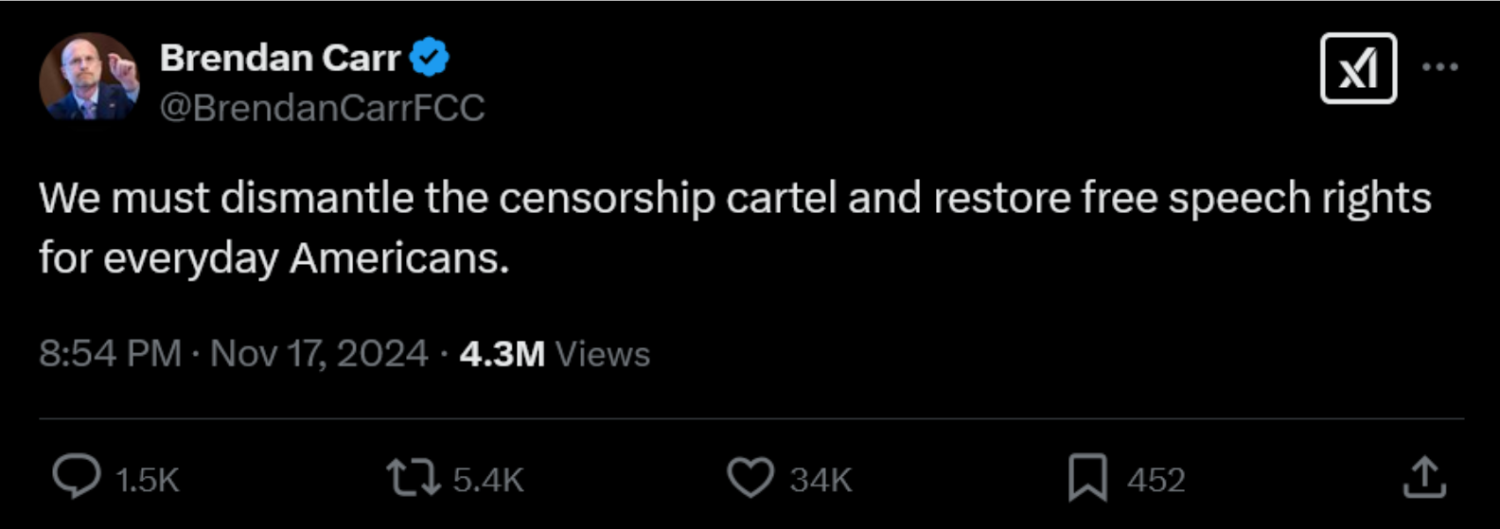
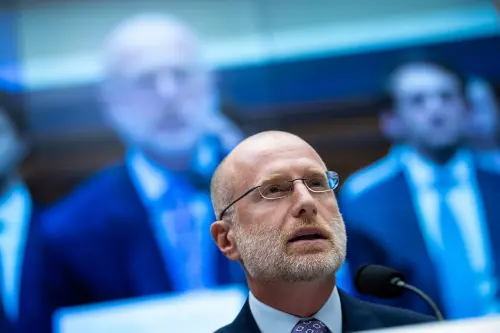
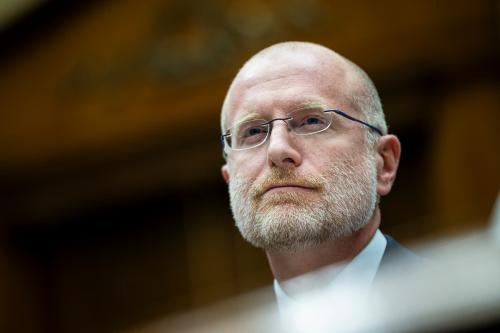
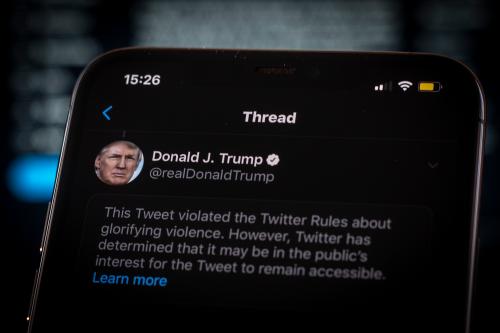

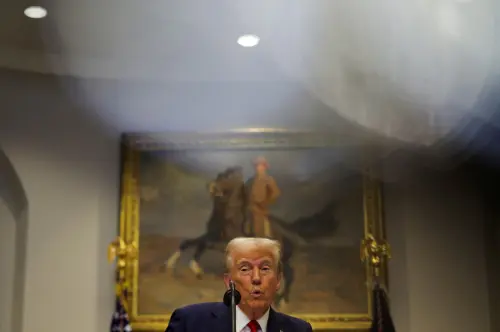
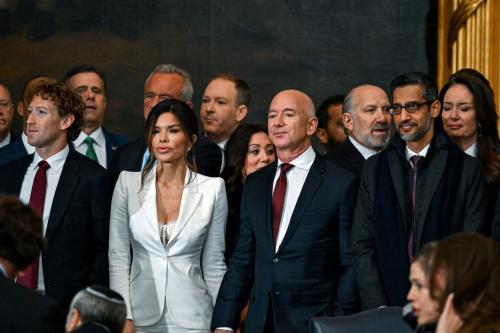
Commentary
Not ‘deregulation’ but heavy-handed regulation at the Trump FCC
February 25, 2025